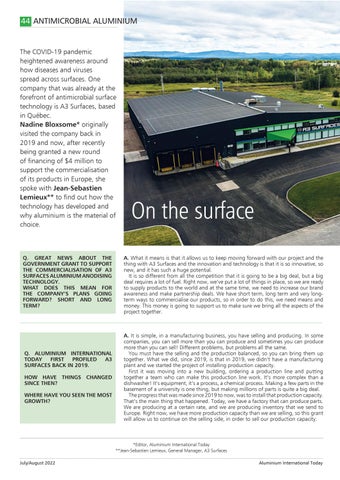44 ANTIMICROBIAL ALUMINIUM
The COVID-19 pandemic heightened awareness around how diseases and viruses spread across surfaces. One company that was already at the forefront of antimicrobial surface technology is A3 Surfaces, based in Québec. Nadine Bloxsome* originally visited the company back in 2019 and now, after recently being granted a new round of financing of $4 million to support the commercialisation of its products in Europe, she spoke with Jean-Sebastien Lemieux** to find out how the technology has developed and why aluminium is the material of choice.
Q. GREAT NEWS ABOUT THE GOVERNMENT GRANT TO SUPPORT THE COMMERCIALISATION OF A3 SURFACES ALUMINIUM ANODISING TECHNOLOGY. WHAT DOES THIS MEAN FOR THE COMPANY’S PLANS GOING FORWARD? SHORT AND LONG TERM?
Q. ALUMINIUM INTERNATIONAL TODAY FIRST PROFILED A3 SURFACES BACK IN 2019. HOW HAVE THINGS CHANGED SINCE THEN? WHERE HAVE YOU SEEN THE MOST GROWTH?
On the surface A. What it means is that it allows us to keep moving forward with our project and the thing with A3 Surfaces and the innovation and technology is that it is so innovative, so new, and it has such a huge potential. It is so different from all the competition that it is going to be a big deal, but a big deal requires a lot of fuel. Right now, we’ve put a lot of things in place, so we are ready to supply products to the world and at the same time, we need to increase our brand awareness and make partnership deals. We have short term, long term and very longterm ways to commercialise our products, so in order to do this, we need means and money. This money is going to support us to make sure we bring all the aspects of the project together.
A. It is simple, in a manufacturing business, you have selling and producing. In some companies, you can sell more than you can produce and sometimes you can produce more than you can sell! Different problems, but problems all the same. You must have the selling and the production balanced, so you can bring them up together. What we did, since 2019, is that in 2019, we didn’t have a manufacturing plant and we started the project of installing production capacity. First it was moving into a new building, ordering a production line and putting together a team who can make this production line work. It’s more complex than a dishwasher! It’s equipment, it’s a process, a chemical process. Making a few parts in the basement of a university is one thing, but making millions of parts is quite a big deal. The progress that was made since 2019 to now, was to install that production capacity. That’s the main thing that happened. Today, we have a factory that can produce parts. We are producing at a certain rate, and we are producing inventory that we send to Europe. Right now, we have more production capacity than we are selling, so this grant will allow us to continue on the selling side, in order to sell our production capacity.
*Editor, Aluminium International Today **Jean-Sebastien Lemieux, General Manager, A3 Surfaces July/August 2022
A3 surfaces.indd 1
Aluminium International Today
06/07/2022 13:02:59
